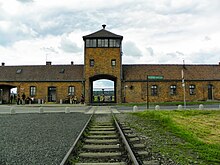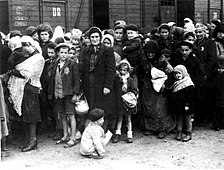
Back جرائم الحرب في بولندا المحتلة خلال الحرب العالمية الثانية Arabic Crímenes de guerra alemanes en Polonia Spanish Crimes de guerre en Pologne occupée pendant la Seconde Guerre mondiale French Crimini perpetrati in Polonia durante la seconda guerra mondiale Italian د دویمې نړیوالې جګړې پر مهال په اشغال شوي پولنډ کې جنګي جرمونه Pashto/Pushto
 Auschwitz II-Birkenau | |
| Date | 1939–1945 |
|---|---|
| Location | Occupied Poland |
| Cause | Invasion of Poland |
| Participants | Wehrmacht, Gestapo, SS, Volksdeutscher Selbstschutz, Trawnikis, Sonderdienst, NKVD, SMERSH, Red Army, OUN-UPA, Lithuanian Security Police |
| Casualties | |
| Around 5 – 6 million | |
| Part of a series on |
| The Holocaust |
|---|
 |
Around six million Polish citizens[1][2][3][4] are estimated to have perished during World War II. Most were civilians killed by the actions of Nazi Germany, the Soviet Union, the Lithuanian Security Police, as well as the Organization of Ukrainian Nationalists and its offshoots (the Ukrainian Insurgent Army, the Self-defense Kushch Units and the Ukrainian People's Revolutionary Army).
At the International Military Tribunal held in Nuremberg, Germany, in 1945–46, three categories of wartime criminality were juridically established: waging a war of aggression; war crimes; and crimes against humanity. For the first time in history, these three categories of crimes were defined after the end of the war in international law as violations of fundamental human values and norms, regardless of internal (local) law or the obligation to follow superior orders. In subsequent years, the crime of genocide was elevated to a distinct, fourth category.
These crimes were committed in occupied Poland on a tremendous scale, unparalleled elsewhere in Europe.[5][6]
- ^ Project in Posterum, Poland World War II casualties. Retrieved 20 September 2013.
- ^ Holocaust: Five Million Forgotten: Non-Jewish Victims of the Shoah. Remember.org.
- ^ AFP/Expatica, Polish experts lower nation's WWII death toll Archived 6 April 2012 at the Wayback Machine, Expatica.com, 30 August 2009
- ^ Tomasz Szarota & Wojciech Materski, Polska 1939–1945. Straty osobowe i ofiary represji pod dwiema okupacjami (Poland, 1939–1945: Human Losses and Victims of Repression under Two Occupations), Warsaw, Institute of National Remembrance (IPN), 2009, ISBN 978-83-7629-067-6 (Introduction online. Archived 23 March 2012 at the Wayback Machine)
- ^ Davies 1986, pp. 65, 351–352, 361.
- ^ Piotrowski 1998, p. 10, Soviet policies..
© MMXXIII Rich X Search. We shall prevail. All rights reserved. Rich X Search